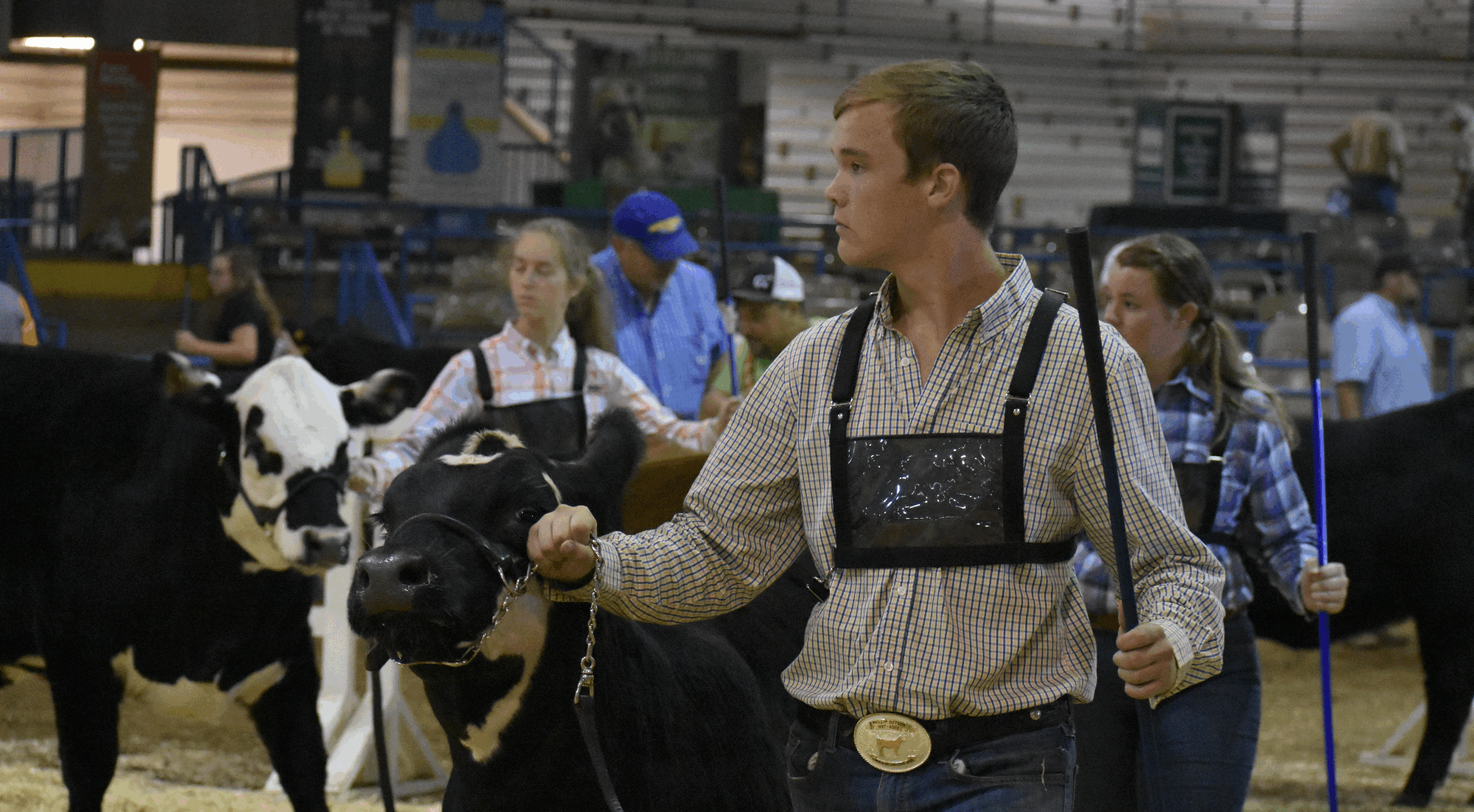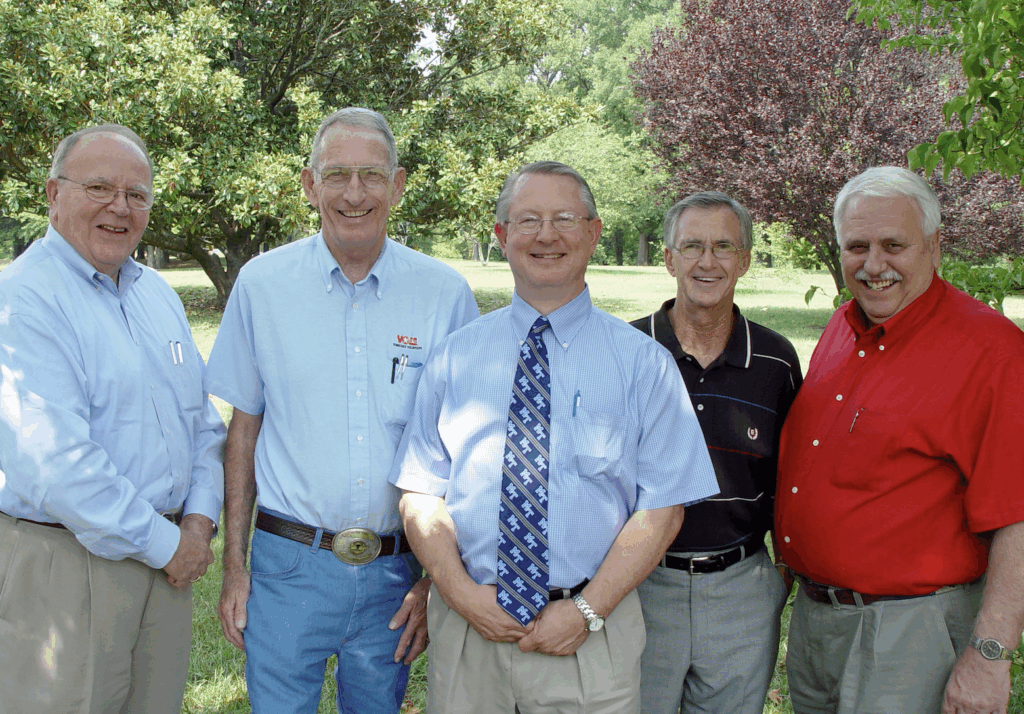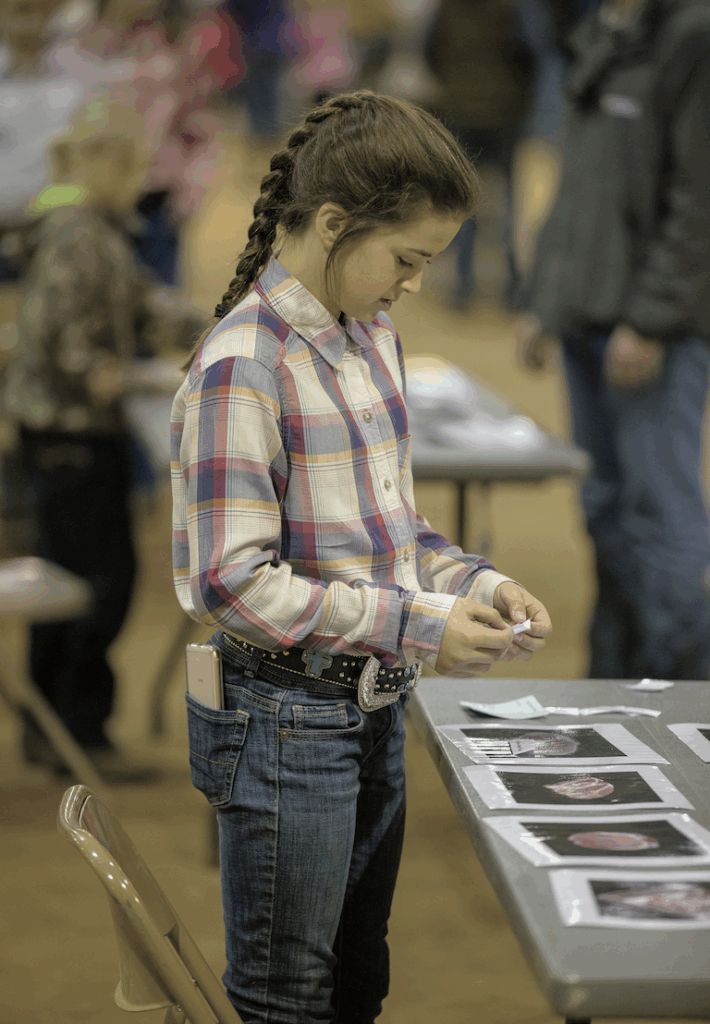
Five animal science retirees unite in support for Extension youth livestock programs
“What we’re talking about here did not exist, really, until this guy came along.” It’s April 2025, and Warren Gill gestures toward his old friend and colleague, the now late Jim Neel. The three of us are seated around a conference table at the UT Extension Eastern Region Office, along with Aaron Fisher, who oversees Extension youth livestock programs.
“This is the history.” Neel commands attention when he speaks. “In 1946, UT Extension, known then as the UT Agricultural Extension Service, hired a new livestock specialist located in Knoxville named Bill Terrell. The dean at the time challenged Bill to develop and market a junior beef heifer program based on livestock shows. But, over the years, society changed, our roles changed, people’s expectations about food safety changed.” In 1985, Neel, then a professor of animal science, recruited Gill to join him in developing a new approach to youth livestock programming.
“We were really good at putting on shows, but there was an educational component missing,” Gill adds. “A child has learned how to lead a calf, but did she learn how to feed that calf? Did she learn how to give it vaccinations? Showmanship alone didn’t really meet our mission.”
By the late 1980s, Neel and Gill, along with other animal science faculty members, including the late David Kirkpatrick, Clyde Lane, and Doyle Meadows, were dividing their time between their everyday faculty responsibilities and their new efforts to prioritize education, workforce training, and the development of soft skills among Tennessee youth. “It’s like a Little League coach,” Neel says. “Children and their parents learn responsibility, good judgment, and camaraderie.”

Within a few years, they’d earned trust and buy-in from county Extension agents, had moved the main show from the old fairgrounds in Nashville to the Hyder-Burks Agriculture Pavilion at Tennessee Technological University, and had introduced new, expanded programming. Gill still takes satisfaction from how well the proof of concept was received. “The main thing I remember is how many parents, during and after that show, came up to us and said, ‘Wow, this is great.’”
Over time, the burdens of developing and administering a more instruction-focused and holistic approach to youth programming became more demanding. “We had created a very nice monster,” Gill says , laughing. Alan Mathew, then head of the Department of Animal Science, lobbied for the creation of a new position dedicated 100 percent to Extension youth livestock programs and hired Claudia Baney, who led the program for several years and, in the process, relieved faculty of some of their daily administrative and oversight responsibilities.
When Baney left Tennessee, current department head and professor Neal Schrick recruited Aaron Fisher for the job. Fisher was highly regarded among the animal science faculty, having earned both his bachelor’s (1998) and master’s (2000) degrees from the program, followed by a decade of service as an Extension specialist and lecturer. In 2018, after seven years at Purdue, he returned to Knoxville and got to work, collaborating with faculty to further expand programming.
That good work continues today, thanks in part to the Dr. James B. (Jm) Neel Developing Champion Youth Endowment. In 2017, as they were moving into retirement, Neel, Gill, Kirkpatrick, Lane, and Meadows collaborated on a new initiative, establishing a fund to provide ongoing financial support to Extension youth livestock programs. Distributions from the endowment have, among other benefits, allowed Fisher to provide new cash prizes and introduce new programming, including a public speaking competition in which students present their best sales pitches to expert judges.
Gill is proud of the positive outcomes of their ingenuity and labor. “Some of us who have been around since the beginning are now seeing it affect a second and third generation.”

Dr. James B. (Jim) Neel Developing Champion Youth Endowment
Eli Dotson
Eli Dotson introduces himself, with a certain pride, as an eighth-generation family farmer from Petersburg, Tennessee. As such, Extension youth livestock programs were an everyday part of his life for as long as he can remember, dating back to the Pee Wee shows where he quickly grew unsatisfied with the blue ribbons that were handed out to every preschooler who participated.
Competing became a defining experience of his life. “It taught me everything from work ethic to being dependable, to knowing there are things more important than yourself in this world.” Dotson would go on to earn a number of honors before heading to UT to earn bachelor’s degrees in animal science and in food and agricultural business (2024). During his time in Knoxville, he also donned the famous coon-skin cap and waved the Power T as UT’s iconic Davy Crockett.
Dotson is now working in sales, and he credits Extension youth livestock programs for his success. “Growing up in agriculture—through 4-H, through FFA, through showing—had the biggest impact on my career. Moreso than any class I took, it gave me a sense of the real world. At a very young age, I learned how to read people, to feel comfortable in any conversation, and to take pride in my work.”

Explore More on
Features
MORE FROM THIS ISSUE

















